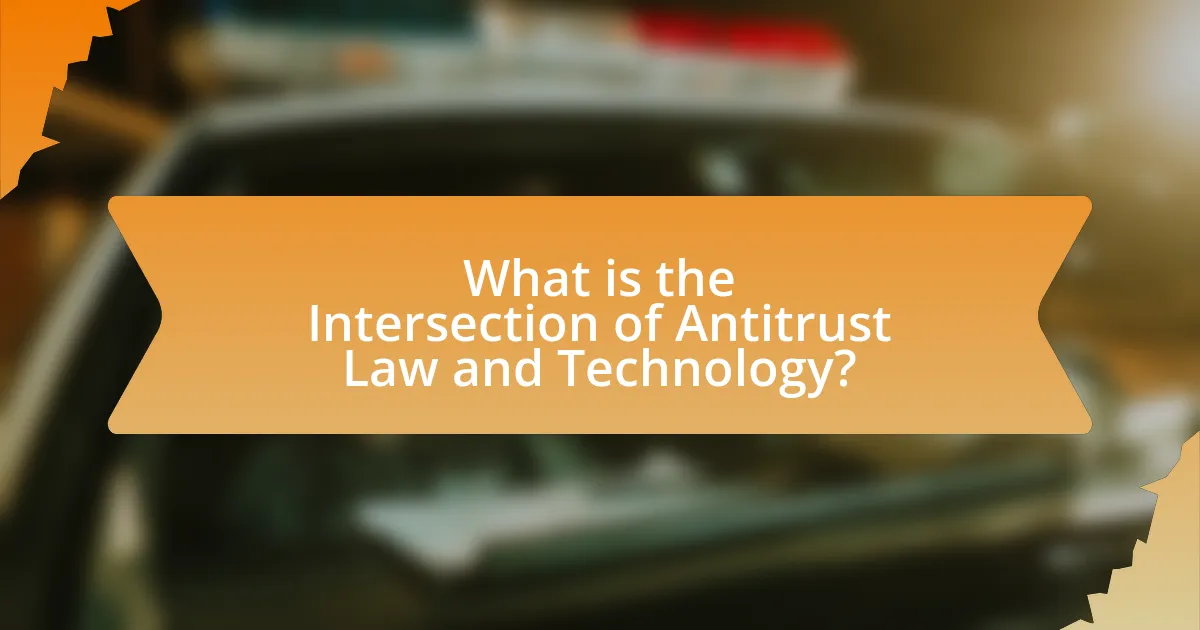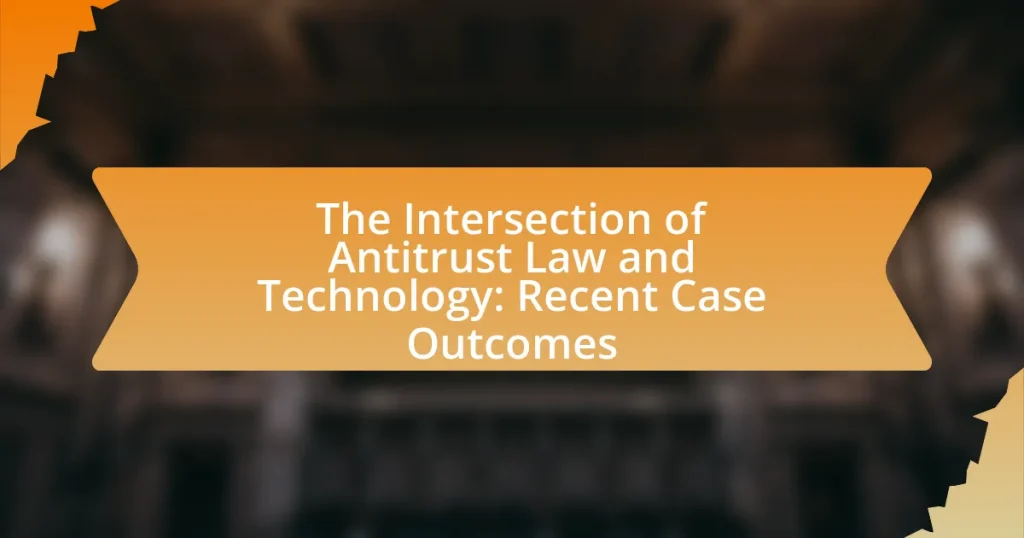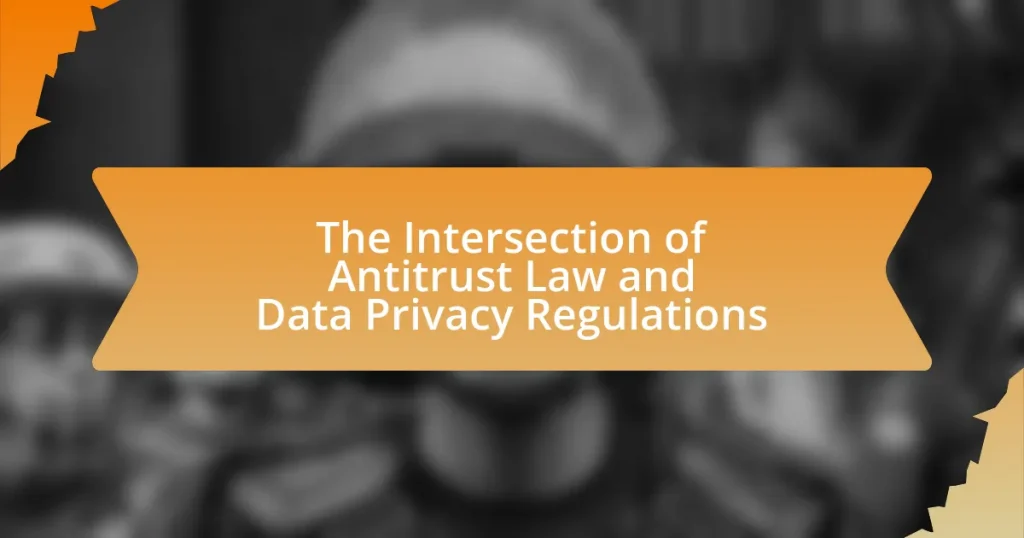The article focuses on the intersection of antitrust law and technology, examining how regulatory frameworks are applied to prevent monopolistic practices within the tech industry. It discusses key antitrust laws, such as the Sherman Act and the Clayton Act, and highlights significant recent cases, including the U.S. Department of Justice’s lawsuits against Google and the European Union’s actions against major tech firms. The article also explores the implications of these legal outcomes for competition, innovation, and corporate practices in the technology sector, emphasizing the need for compliance and proactive engagement with regulators to foster a fair competitive environment.

What is the Intersection of Antitrust Law and Technology?
The intersection of antitrust law and technology involves the regulation of competitive practices within the tech industry to prevent monopolistic behaviors and promote market fairness. Antitrust laws, such as the Sherman Act and the Clayton Act, are applied to technology companies to address issues like market dominance, anti-competitive mergers, and unfair trade practices. For instance, the U.S. Department of Justice’s lawsuit against Google in 2020 highlighted concerns over its search engine monopoly, illustrating how antitrust enforcement is adapting to the unique challenges posed by digital platforms. This legal scrutiny aims to ensure that innovation and consumer choice are not stifled by the concentration of market power in the technology sector.
How do antitrust laws apply to technology companies?
Antitrust laws apply to technology companies by regulating their market behavior to prevent monopolistic practices and promote competition. These laws, such as the Sherman Act and the Clayton Act in the United States, prohibit anti-competitive agreements and actions that could harm consumers or stifle innovation. For instance, in 2020, the U.S. Department of Justice filed a lawsuit against Google, alleging that it engaged in anti-competitive practices to maintain its dominance in the search engine market, which constitutes a violation of antitrust laws. This case exemplifies how regulatory bodies scrutinize technology companies to ensure they do not abuse their market power, thereby fostering a competitive environment that benefits consumers and the economy.
What are the key principles of antitrust law relevant to technology?
The key principles of antitrust law relevant to technology include the prohibition of monopolistic practices, the prevention of anti-competitive mergers, and the enforcement of fair competition standards. These principles aim to promote market competition and prevent companies from abusing their market power. For instance, the Sherman Act prohibits monopolization and attempts to monopolize, while the Clayton Act addresses anti-competitive mergers that may substantially lessen competition or tend to create a monopoly. Additionally, the Federal Trade Commission Act prohibits unfair methods of competition, which is particularly pertinent in the rapidly evolving tech sector where companies may engage in practices that stifle innovation or limit consumer choice. These principles are enforced through various legal actions and regulatory scrutiny, ensuring that technology markets remain competitive and beneficial for consumers.
How do these principles impact competition in the tech industry?
Antitrust principles significantly impact competition in the tech industry by promoting fair market practices and preventing monopolistic behaviors. These principles, enforced through regulations and legal actions, ensure that no single company can dominate the market to the detriment of consumers and innovation. For instance, recent antitrust cases against major tech firms, such as the U.S. Department of Justice’s lawsuit against Google in 2020, highlight efforts to dismantle anti-competitive practices that restrict market entry for smaller companies. This legal scrutiny fosters a more competitive environment, encouraging innovation and diverse offerings in technology.
Why is the intersection of antitrust law and technology significant?
The intersection of antitrust law and technology is significant because it addresses the competitive practices of major tech companies that can lead to monopolistic behaviors. Antitrust laws aim to promote fair competition and prevent market dominance that stifles innovation and consumer choice. For instance, the U.S. Department of Justice’s lawsuit against Google in 2020 highlighted concerns over its search engine monopoly, which allegedly harms competitors and consumers by limiting choices and inflating prices. This case exemplifies how antitrust enforcement is crucial in regulating the rapidly evolving tech landscape, ensuring that technological advancements benefit the market rather than create barriers to entry for new players.
What are the potential consequences of antitrust violations in tech?
Antitrust violations in tech can lead to significant legal and financial consequences for companies involved. These consequences may include hefty fines imposed by regulatory bodies, which can reach billions of dollars, as seen in cases like the European Union’s antitrust fines against Google totaling over €8 billion. Additionally, companies may face restrictions on their business practices, such as divestitures or changes in operational structures, aimed at promoting competition. Furthermore, antitrust violations can damage a company’s reputation, leading to loss of consumer trust and potential declines in market share. Historical examples, such as the breakup of AT&T in the 1980s, illustrate the long-term impacts of antitrust actions on corporate structure and market dynamics.
How does public perception influence antitrust actions against tech firms?
Public perception significantly influences antitrust actions against tech firms by shaping regulatory priorities and public policy. When the public expresses concerns about monopolistic practices or unfair competition, it prompts government agencies to investigate and potentially take legal action. For instance, the scrutiny faced by companies like Google and Facebook has been largely driven by public outcry regarding data privacy and market dominance, leading to increased antitrust investigations and lawsuits. This correlation is evident in the 2020 antitrust lawsuit against Google, where public dissatisfaction with its market power and data practices played a crucial role in mobilizing regulatory action.
What recent developments have occurred in this intersection?
Recent developments in the intersection of antitrust law and technology include significant legal actions against major tech companies, such as the U.S. Department of Justice filing a lawsuit against Google in January 2023, alleging anti-competitive practices in online advertising. This lawsuit builds on previous cases, including the 2020 antitrust suit against Google, which accused the company of maintaining monopolistic control over search and advertising markets. Additionally, in September 2023, the European Union imposed a record fine of €4.3 billion on Meta for anti-competitive behavior related to its advertising practices. These cases reflect a growing trend of regulatory scrutiny aimed at curbing monopolistic practices in the tech industry, highlighting the evolving landscape of antitrust enforcement.
What notable cases have emerged in the last few years?
Notable cases that have emerged in the last few years include the United States v. Google LLC, where the Department of Justice filed a lawsuit in 2020 alleging that Google engaged in anti-competitive practices to maintain its dominance in the search engine market. Additionally, the Federal Trade Commission’s case against Facebook in 2020 accused the company of monopolistic behavior by acquiring potential rivals like Instagram and WhatsApp to suppress competition. These cases highlight the increasing scrutiny of technology companies under antitrust laws, reflecting a significant shift in regulatory focus on market competition and consumer protection.
How have these cases shaped the current landscape of antitrust law in technology?
Recent antitrust cases against major technology companies have significantly influenced the current landscape of antitrust law in the technology sector by establishing stricter scrutiny on monopolistic practices. For instance, the U.S. Department of Justice’s lawsuit against Google in 2020 highlighted concerns over its dominance in online search and advertising, prompting a reevaluation of market definitions and competitive practices. Additionally, the Federal Trade Commission’s actions against Facebook in 2020 underscored the importance of assessing acquisitions that may stifle competition, leading to a more rigorous examination of mergers and acquisitions in the tech industry. These cases have resulted in increased regulatory attention and a shift towards proactive enforcement, aiming to prevent anti-competitive behavior and promote market fairness.

What are the Recent Case Outcomes in Antitrust Law and Technology?
Recent case outcomes in antitrust law and technology include significant rulings against major tech companies for anti-competitive practices. For instance, in 2023, the U.S. Federal Trade Commission successfully challenged Microsoft’s acquisition of Activision Blizzard, arguing it would stifle competition in the gaming market. Additionally, the European Union imposed a record fine on Google for abusing its dominant position in online advertising, reinforcing the need for compliance with antitrust regulations. These cases illustrate a growing trend of regulatory scrutiny aimed at maintaining competitive markets in the technology sector.
What were the key rulings in recent antitrust cases involving technology companies?
Recent antitrust cases involving technology companies have resulted in significant rulings, particularly against major firms like Google, Apple, and Facebook. In 2023, a federal court ruled that Google engaged in anti-competitive practices by favoring its own services in search results, which violated antitrust laws. Additionally, the European Union imposed a record fine on Meta for anti-competitive behavior related to data privacy and advertising practices. These rulings underscore a growing regulatory scrutiny aimed at curbing monopolistic behaviors in the tech industry, reflecting a shift towards stricter enforcement of antitrust laws globally.
How did the courts interpret antitrust laws in these cases?
The courts interpreted antitrust laws in these cases by emphasizing the need to balance competition with innovation in the technology sector. In landmark rulings, such as the United States v. Microsoft Corp., the courts focused on the monopolistic practices that stifled competition, determining that Microsoft’s bundling of its software products constituted anti-competitive behavior. Additionally, in cases involving major tech companies, courts have scrutinized mergers and acquisitions to ensure they do not create unfair market dominance, reflecting a commitment to maintaining competitive markets while recognizing the unique dynamics of the technology industry. These interpretations underscore the courts’ role in adapting antitrust principles to address the complexities of modern technology markets.
What implications do these rulings have for future technology regulations?
The implications of recent antitrust rulings for future technology regulations include a potential shift towards stricter oversight of monopolistic practices in the tech industry. These rulings signal that regulatory bodies may prioritize consumer welfare and competition over the traditional leniency afforded to tech giants, as evidenced by cases like the U.S. v. Google, where the court emphasized the need to address anti-competitive behavior. This trend suggests that future regulations may focus on enhancing market access for smaller firms and increasing transparency in data practices, thereby reshaping the competitive landscape in technology sectors.
How have these outcomes affected major technology firms?
Recent antitrust outcomes have significantly impacted major technology firms by increasing regulatory scrutiny and altering their business practices. For instance, the U.S. Department of Justice’s lawsuit against Google in 2020 aimed to challenge its dominance in online advertising and search, leading to heightened compliance costs and potential changes in operational strategies for the company. Similarly, the European Union’s antitrust fines against companies like Apple and Amazon have forced these firms to reconsider their pricing models and market strategies to avoid further penalties. These legal challenges not only affect financial performance but also influence innovation and competitive dynamics within the technology sector.
What changes have companies made in response to recent antitrust rulings?
Companies have implemented structural changes, adjusted pricing strategies, and enhanced compliance measures in response to recent antitrust rulings. For instance, major tech firms like Google and Facebook have restructured their business practices to avoid monopolistic behaviors, such as altering advertising algorithms and increasing transparency in data usage. Additionally, companies are investing in legal compliance teams to ensure adherence to antitrust laws, reflecting a proactive approach to mitigate potential legal challenges. These changes are driven by the need to align with regulatory expectations and to avoid hefty fines, as evidenced by the significant penalties imposed in recent antitrust cases.
How have these cases influenced mergers and acquisitions in the tech sector?
Recent antitrust cases have significantly influenced mergers and acquisitions in the tech sector by increasing regulatory scrutiny and altering strategic approaches. For instance, the Federal Trade Commission’s actions against major tech companies have led to a more cautious environment where firms must now consider potential antitrust implications before pursuing mergers. This heightened scrutiny is evidenced by the blocked merger attempts, such as the proposed acquisition of Activision Blizzard by Microsoft, which faced extensive regulatory challenges. Consequently, tech companies are now more likely to engage in thorough legal assessments and seek alternative strategies, such as partnerships or organic growth, to mitigate the risk of antitrust violations.
What lessons can be learned from recent antitrust case outcomes?
Recent antitrust case outcomes highlight the importance of scrutinizing market dominance and the behavior of large technology firms. These cases demonstrate that regulatory bodies are increasingly willing to challenge anti-competitive practices, as seen in the U.S. Department of Justice’s lawsuit against Google in 2020, which accused the company of maintaining its search engine monopoly through exclusionary agreements. Furthermore, the European Union’s actions against companies like Apple and Amazon illustrate a global trend towards enforcing stricter antitrust regulations. These outcomes emphasize the necessity for companies to adopt fair competition practices and the potential consequences of failing to do so, including significant fines and operational changes.
What strategies can technology companies adopt to avoid antitrust issues?
Technology companies can adopt several strategies to avoid antitrust issues, including ensuring compliance with competition laws, promoting transparency in business practices, and fostering fair competition. Compliance with competition laws involves regularly reviewing business practices to align with legal standards, which can prevent anti-competitive behavior. Promoting transparency, such as disclosing pricing strategies and terms of service, helps build trust with consumers and regulators, reducing the likelihood of scrutiny. Additionally, fostering fair competition by avoiding exclusive agreements and not engaging in predatory pricing can mitigate risks associated with antitrust claims. These strategies are supported by historical cases where companies that prioritized compliance and transparency faced fewer legal challenges, demonstrating their effectiveness in navigating antitrust regulations.
How can policymakers improve antitrust enforcement in the tech industry?
Policymakers can improve antitrust enforcement in the tech industry by updating existing regulations to address the unique challenges posed by digital markets. Current antitrust laws, established before the rise of major tech platforms, often fail to capture anti-competitive behaviors such as data monopolization and platform dominance. For instance, the European Union’s Digital Markets Act aims to create a fairer digital ecosystem by imposing stricter rules on large tech companies, demonstrating a proactive approach to regulation. Additionally, enhancing collaboration between regulatory bodies across jurisdictions can lead to more effective enforcement, as seen in the coordinated efforts of the U.S. and EU in investigating major tech firms. These strategies can help ensure that antitrust enforcement keeps pace with rapid technological advancements and evolving market dynamics.

What Future Trends Can We Expect in Antitrust Law and Technology?
Future trends in antitrust law and technology will likely focus on increased scrutiny of digital platforms and the implementation of more stringent regulations. Regulatory bodies, such as the Federal Trade Commission and the European Commission, are actively pursuing cases against major tech companies, indicating a shift towards a more aggressive enforcement approach. For instance, the European Union’s Digital Markets Act aims to prevent anti-competitive practices by large tech firms, setting a precedent for similar legislation globally. Additionally, the rise of artificial intelligence and data privacy concerns will drive lawmakers to adapt existing antitrust frameworks to address new challenges posed by technology. This evolution reflects a growing recognition of the need to balance innovation with fair competition in the digital economy.
How might technology advancements influence antitrust regulations?
Technology advancements may lead to more stringent antitrust regulations as they create new market dynamics and competitive challenges. For instance, the rise of digital platforms has prompted regulators to reassess traditional antitrust frameworks, which were primarily designed for physical markets. The European Union’s Digital Markets Act exemplifies this shift, aiming to prevent anti-competitive practices by large tech companies, thereby reflecting a growing recognition that technology can distort competition. Additionally, the rapid evolution of data analytics and artificial intelligence raises concerns about monopolistic behaviors, necessitating updated regulatory approaches to ensure fair competition and consumer protection.
What role does innovation play in shaping antitrust law?
Innovation plays a critical role in shaping antitrust law by influencing regulatory frameworks and enforcement practices. As new technologies emerge, they can disrupt existing market structures, prompting lawmakers and regulators to adapt antitrust policies to address potential anti-competitive behaviors. For instance, the rise of digital platforms has led to increased scrutiny of monopolistic practices, as seen in cases involving major tech companies like Google and Facebook, where innovation in data usage and market strategies raised concerns about consumer welfare and competition. This dynamic interaction between innovation and antitrust law ensures that legal standards evolve to maintain fair competition in rapidly changing markets.
How can emerging technologies challenge existing antitrust frameworks?
Emerging technologies can challenge existing antitrust frameworks by creating new market dynamics that traditional regulations struggle to address. For instance, the rise of digital platforms and algorithms can lead to monopolistic behaviors that are difficult to detect and regulate under current laws, which were designed for more static market conditions. A notable example is the dominance of tech giants like Google and Amazon, which leverage data and network effects to maintain market power, complicating the application of antitrust principles that focus on price and output. Additionally, the rapid pace of innovation in sectors like artificial intelligence and blockchain can outstrip the ability of regulatory bodies to adapt, leading to gaps in enforcement and oversight. This misalignment between technology evolution and regulatory frameworks can result in anti-competitive practices that harm consumers and stifle competition.
What proactive measures can technology companies take regarding antitrust compliance?
Technology companies can implement comprehensive antitrust compliance programs to proactively address legal requirements. These programs should include regular training for employees on antitrust laws, conducting internal audits to identify potential compliance risks, and establishing clear reporting mechanisms for antitrust concerns. For instance, a study by the American Bar Association highlights that companies with robust compliance programs are less likely to face antitrust litigation, demonstrating the effectiveness of such measures. Additionally, engaging with legal experts to review business practices and ensuring transparency in pricing and market behavior can further mitigate antitrust risks.
What best practices should tech firms implement to ensure compliance?
Tech firms should implement a comprehensive compliance program that includes regular training, robust data governance, and continuous monitoring of antitrust laws. Regular training ensures that employees understand legal obligations and company policies, while robust data governance establishes clear protocols for data handling and sharing, which is crucial in avoiding antitrust violations. Continuous monitoring of antitrust laws allows firms to stay updated on legal changes and adapt their practices accordingly. According to a report by the Federal Trade Commission, companies with effective compliance programs are less likely to face legal challenges, highlighting the importance of these practices in mitigating risks associated with antitrust issues.
How can companies engage with regulators to foster a fair competitive environment?
Companies can engage with regulators to foster a fair competitive environment by actively participating in policy discussions and providing transparent data on market practices. This engagement can include submitting comments during public consultations, attending regulatory hearings, and collaborating on research initiatives that inform regulatory frameworks. For instance, companies like Google and Facebook have engaged with regulators by sharing insights on algorithmic transparency and data privacy, which helps shape fair competition standards. Such proactive communication not only builds trust but also ensures that regulatory measures are informed by real-world business practices, ultimately leading to a more balanced competitive landscape.
What are the implications of global antitrust trends for technology companies?
Global antitrust trends significantly impact technology companies by increasing regulatory scrutiny and potential legal challenges. As governments worldwide, including the European Union and the United States, intensify their focus on monopolistic practices, technology firms face heightened risks of investigations and penalties. For instance, the European Commission’s fines against Google, totaling over €8 billion for antitrust violations, illustrate the financial repercussions of non-compliance. Additionally, these trends may compel technology companies to alter their business practices, such as reducing mergers and acquisitions or changing pricing strategies, to avoid antitrust violations. This evolving landscape necessitates that technology firms remain vigilant and adapt to new regulations to mitigate legal risks and maintain competitive advantages.
How do international antitrust laws affect U.S. technology firms?
International antitrust laws significantly impact U.S. technology firms by imposing regulations that can limit their business practices and market strategies. For instance, the European Union’s General Data Protection Regulation (GDPR) and its Digital Markets Act (DMA) enforce strict compliance requirements that U.S. firms must adhere to when operating in Europe, affecting their data handling and competitive practices. Additionally, cases like the European Commission’s fines against Google for anti-competitive behavior illustrate how international authorities can impose substantial penalties, influencing U.S. firms’ operational decisions and market approaches. These laws compel U.S. technology companies to adapt their business models to avoid legal repercussions and maintain market access in foreign jurisdictions.
What can tech companies learn from antitrust cases in other countries?
Tech companies can learn the importance of compliance and proactive regulatory engagement from antitrust cases in other countries. For instance, the European Union’s antitrust actions against Google, which resulted in a €2.42 billion fine for favoring its own shopping service, highlight the necessity for companies to ensure fair competition practices. Additionally, the case of Microsoft in the EU, where the company faced significant penalties for bundling its software, underscores the need for transparency and the potential consequences of monopolistic behavior. These examples demonstrate that tech companies must adopt strategies that prioritize fair competition and regulatory adherence to avoid substantial legal repercussions.



